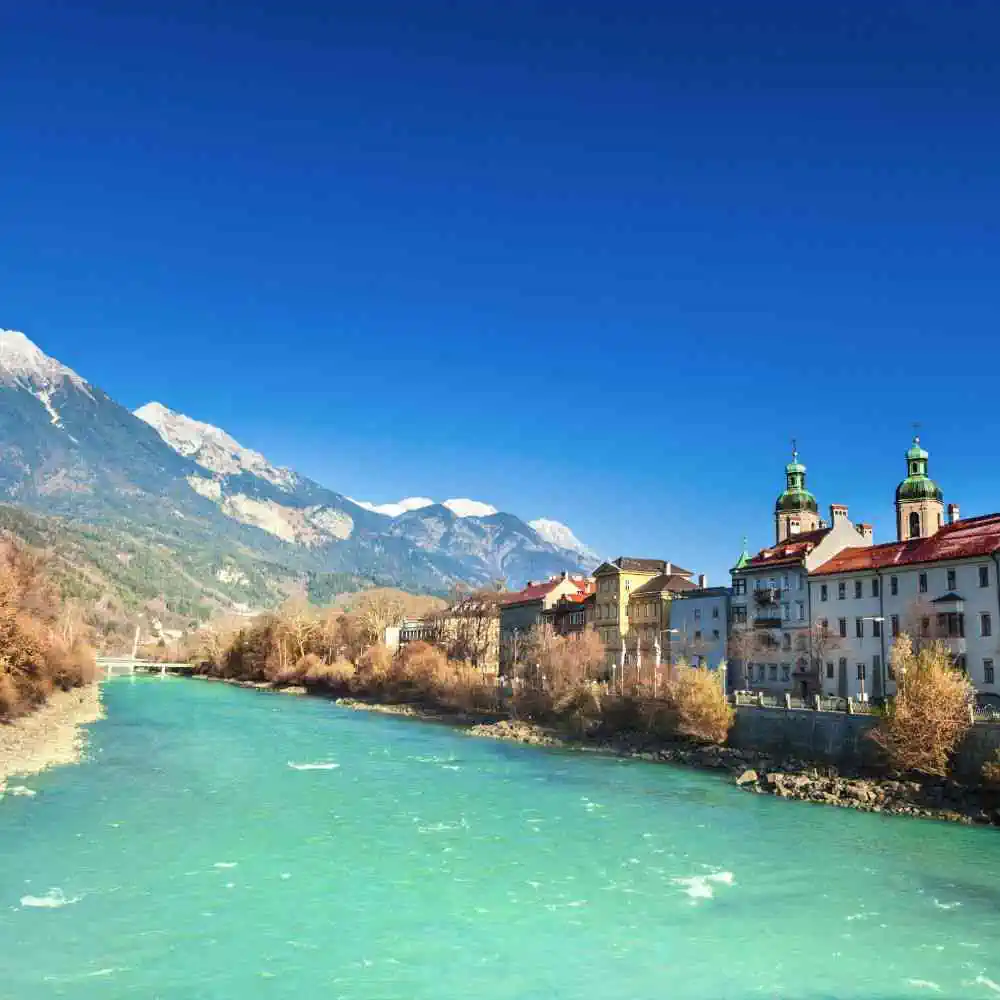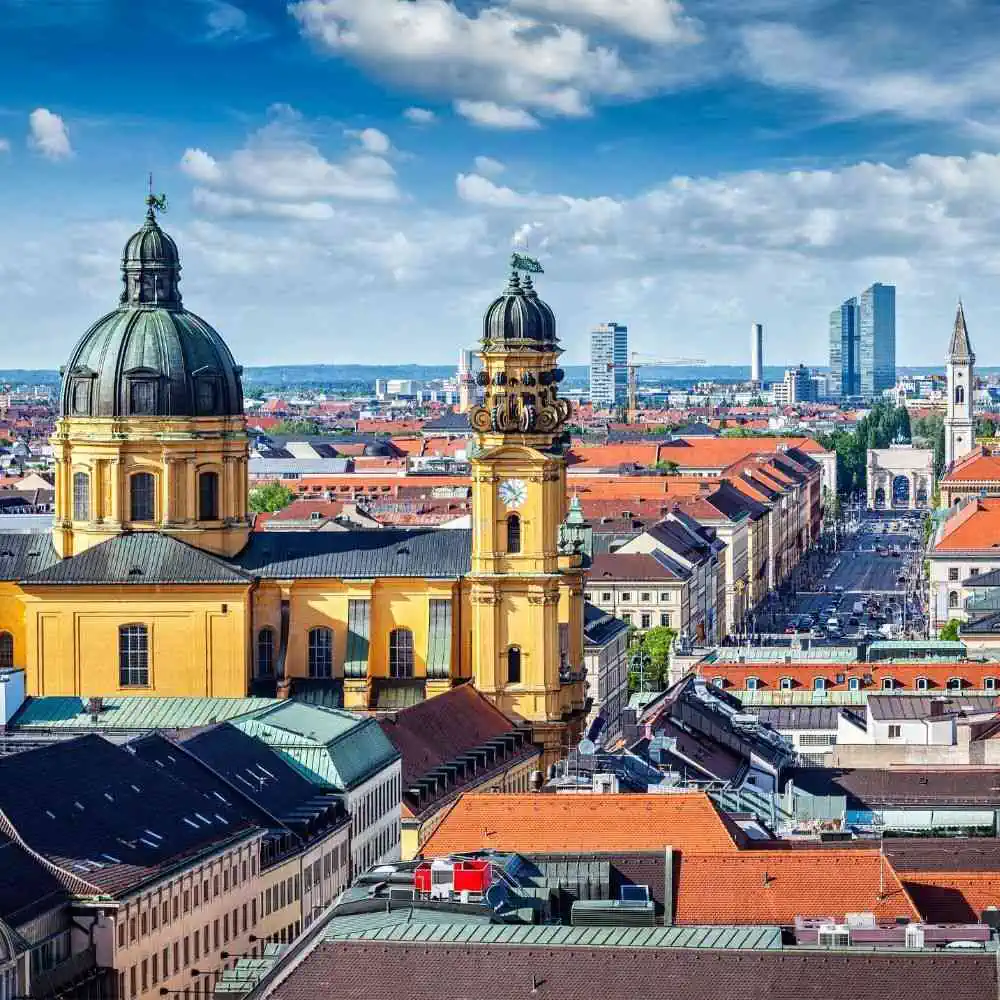You will depart from Munchen Hbf, located right in the city center of Munich, and enjoy the beautiful scenery of the journey while you arrive in Innsbruck Hbf, also located in the heart of Innsbruck.
Trains from Munich to Innsbruckfrom € 29.00
Trains from Munich to Innsbruck
Travelling by train: Munich - Innsbruck
Are you ready for an exciting journey from Munich to Innsbruck? Your trip will take you through some of the most breathtaking views of the German and Austrian countryside. The fastest route is only 90 minutes and you will pass through some of the most famous cities, towns and landmarks in the region. To start, your departure will be from the Munich Hauptbahnhof station. On the way to Innsbruck, you will pass through the beautiful towns of Rosenheim, Kufstein, and Wörgl. On the journey, you will get to see some of the most iconic places in Europe including the famous Kufstein Fortress, the world-renowned Rosenheim Herb Garden, and the stunning Wörgl Lake. After finally arriving at Innsbruck station, you will be greeted by the breathtaking views of the mountains that surround the city. The journey from Munich to Innsbruck is an unforgettable experience that you will never forget. Along the way, you'll be able to take in some of the most beautiful sights in Europe from the comfort of your seat. Whether you are travelling for business or pleasure, the journey offers something for everyone. If you are looking for an exciting adventure, then the journey from Munich to Innsbruck is the one for you. Along the way, you can admire stunning natural scenery, take in the beauty of Austrian culture, and explore some of the most famous cities and landmarks in the region. Make sure to take some time to take in the stunning views and make memories that you will never forget!

Journey details
How long does the train from Munich to Innsbruck take?
The train from Munich to Innsbruck takes approximately 3 hours and 30 minutes. The duration of the train journey is 3 hours and 30 minutes.
What is the fastest journey from Munich to Innsbruck by train?
The fastest journey by train from Munich to Innsbruck is approximately 3 hours and 5 minutes. The duration of the fastest train journey is 3 hours and 5 minutes.
How much does the train cost from Munich to Innsbruck?
The train costs €39.90 in a second-class seat from Munich to Innsbruck. This price may vary, depending on the train operator.
How much does the Munich to Innsbruck?
Yes, there is a direct train from Munich to Innsbruck, operated by the Deutsche Bahn and Austrian Railways. With this train, you do not need to change to another train.
What is the distance from Munich to Innsbruck by train?
The distance from Munich to Innsbruck by train is 287 kilometers. The train stops at several cities between Munich and Innsbruck.
Which are the cities that the train stops from Munich to Innsbruck?
The train stops at several cities between Munich and Innsbruck, such as Augsburg, Ulm, Günzburg, Donauwörth, Neu-Ulm, Neuburg an der Donau, Ingolstadt and Rosenheim.
Buy train tickets from Munich to Innsbruck
Traveling by train from Munich to Innsbruck is an easy and comfortable journey. RailClick is the best way to travel Europe by train.
Munich: Places to see
Munich (München), in Germany is a fascinating destination that offers visitors a blend of city delights, lively culture, and rich historical and architectural gems to explore. From soaring cathedrals to beautiful parks to world-famous beer halls, there is something for everyone in this Bavarian city. Here is a list of seven must-visit sites while in Munich, including information on each spot’s historical and architectural significance, practical details, and insider tips.
Nymphenburg Palace: The grand Baroque palace, built for Elector Ferdinand Maria in 1664, is now a museum featuring beautiful galleries and gardens. Located in the western section of Munich, it is a great spot for a leisurely stroll. Entrance is €12.50 and it’s open until 6 pm. Take a guided tour to learn more about its history.
Hofbräuhaus: This legendary beer hall has been around since 1589, and remains one of the most iconic spots in Munich. Here, visitors can sample the city’s famous Bavarian beer while enjoying traditional Bavarian dishes. Prices are quite reasonable and its open until at least 11 pm. Come early to avoid the crowds and find a good seat.
Marienplatz and City Hall: Located in the heart of the city, Marienplatz is one of Munich’s most iconic squares. The Old City Hall (Altes Rathaus) here is a magnificent Gothic building, while the New City Hall (Neues Rathaus) boasts a unique Neo-Gothic exterior. Free to visit. Catch the famous Glockenspiel at the New City Hall at 11 am or 12 pm.
English Garden: This large public park is a haven of nature and tranquillity in Munich. Spanning an area of more than 920 acres, it’s a great spot for a relaxing walk or a picnic. It also features a beer garden. Free to visit. Take a boat ride along the lake for the perfect romantic evening.
Frauenkirche and St. Peters Church: Located on Munich’s central pedestrianised street, these two churches are important landmarks that offer visitors a glimpse of the city’s religious traditions. Frauenkirche is an impressive Gothic building, while St. Peters is a more modern structure. Free to visit. Look out for the beautiful stained glass windows inside.
BMW Museum: Learn all about the famous German carmaker at this factual and educational museum in Munich. Visitors get a comprehensive overview of the company’s history, as well as a chance to explore some of its iconic cars. Entrance is €12 and the museum is open until 8 pm. Book a guided tour to get the full experience.
Viktualienmarkt: This colorful, traditional food market is the perfect place to sample some of Munich’s local specialties. Here, visitors can find Bavarian sausages, freshly baked pretzels, cheeses, cakes, and plenty of other delicious treats. Free to visit. Stop by on a Sunday morning to experience the market in all its glory.
A trip to Munich provides a wealth of experiences for travelers, from beer halls to old churches to fascinating museums. Whether you’re looking for a cultural exploration or a romantic getaway, the city’s diverse offerings guarantee an enjoyable time.

Innsbruck: Places to see
The majestic city of Innsbruck, nestled in the alpine region of Austria, is an outdoor paradise. Surrounded by stunning mountain views, it's easy to forget the city's historical and architectural wonders. From imperial palaces to unique food markets and old churches, here are seven of the must-visit sites when visiting Innsbruck.
Golden Roof: One of Innsbruck's most iconic attractions, the Golden Roof is a three-storey balcony decked out with 2,657 fire-gilded copper tiles. Dating back to the 15th-century, it was used by Maximilian I as an imperial box for court festivals and tournaments. Located in the heart of the Old Town, it's free to visit, although you can pay for a tour of the balcony or an exhibition.
Ambras Castle: Overlooking Innsbruck from its hilltop position is the Emperor's majestic Renaissance palace, Ambras Castle. Offering beautiful views of the city, it's home to an impressive art collection and a unique armouries chamber exhibiting some of Europe's most impressive suits of armour. It's open from 09:00 to 17:00 daily, with tickets costing 16 euros for adults.
Hofburg Imperial Palace: This Baroque palace was once the winter home to the Austrian Habsburgs. It boasts a lavish interior, ornate gardens and exquisite works of art by Rubens, Brueghel and Habsburg. It is open from 09:00 to 17:00, with tickets costing 16.50 euros.
Cathedral of St. James: Dating back to the year 1150, the Gothic Cathedral of St. James is one of the city's oldest churches. It holds a variety of impressive sculptures and artifacts, and is open daily from 09:00 to 17:00. Entry is free.
Swarovski Crystal World: This unique attraction is a must-visit for any crystal lover. Home to the famous 'Giant' Swarovski crystal, the complex also includes art installations, a café and a sparkling shop. Tickets cost 22 euros for adults, and the complex is open from 09:00 to 18:00 daily.
Alpenzoo: Located high on the Hungerburg Hill, the 2,000-meter Alpenzoo is Europe's highest zoo and the ideal place to learn about alpine wildlife. This modern facility has over 2,000 animals, including lynx, ibex and marmots, and is open from 09:00 to 17:30 daily. Tickets cost 16 euros.
Market and Food: Indulge your taste buds with a visit to Innsbruck's food market, which sells locally produced goods like smoked bacon, cheese, apples and herbs. The city also has a variety of delicious eateries featuring Tyrolean specialties, as well as international restaurants and pubs.
With its stunning views, magnificent architecture and delicious cuisine, Innsbruck is an unforgettable destination. After taking in all of these wonderful sights, you'll be sure to have an unforgettable experience in this amazing city.

Munich: Main train stations
Munich, in Germany is home to the country's largest train station, München Hauptbahnhof. Connecting the city to over 150 destinations and serving as many as 450,000 passengers a day, it is the busiest train station in Germany. There are also other important train stations in Munich such as München Ost, München Pasing or München Laim.
München Hauptbahnhof is situated at Bayerstrasse 10a-c, 80335 Munich. It is open 24 hours a day, 7 days a week. There are several services available, including luggage storage and a staffed information desk. The station can be reached by car and public transport such as S-Bahn, U-Bahn and buses, and is located near the city center, allowing passengers to reach popular tourist attractions easily.
- Munchen Hbf
- Munchen Ost
- Munchen-Pasing
- Munchen Hackerbrucke
Innsbruck: Main train stations
Innsbruck, in Austria, is home to the main train station of the city, Innsbruck Hauptbahnhof. Besides this, there are several minor stations around the city area, such as Innsbruck West, Innsbruck Nord and Innsbruck Ost.
The Innsbruck Hauptbahnhof is located at Salurner Strasse 15, 6020 Innsbruck. It is open from 4.15am to 11.45pm. The station provides several services such as luggage storage, car rental and bike rental. For inquires, it can be contacted through +4385124850.
- Innsbruck
- Innsbruck Westbahnhof
Munich - Innsbruck: How to get the best deals
Book in Advance:
Just like with airfares, train ticket prices tend to rise as the departure date gets closer. Booking weeks or even months in advance can save you a significant amount.
Travel During Off-Peak Hours:
Avoid traveling during peak times such as weekday mornings and evenings. Opt for midday, late evening, or mid-week rides when there's less demand.
Consider Slower Trains or non direct routes:
Express or high-speed trains might save time, but they're often pricier. Opting for regional or slower services can reduce your fare.
Look for Special Deals and Promotions:
Train operators occasionally have promotions or special deals, especially during off-peak seasons. It's worth signing up for newsletters. Additionally, there are sometimes group or return ticket discounts, so consider these options if they fit your travel plans.
- Contact Us


